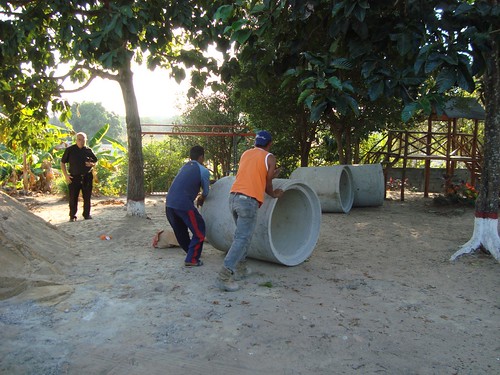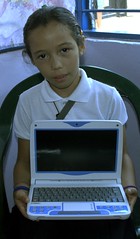
Thanks to generous donations forwarded to us by Venezuela Lutheran
Mission Partnership, we have begun construction of outdoor sanitary
facilities as a first step toward building a freestanding
classroom/chapel building. The need for this building is growing along
with Luz Maria's tutoring program in the afternoon. This program
has grown to the point where we have had to split it into different
age-groups at different times.
Water for the new sanitary facilities will be pumped from the well at
the botton of our hill. The well also would be used to supply water for
our fruits, vegetables and the ornamental plants that make for a pleasant environment in which to learn, play and worship. We consume a good portion of our homegrown fruits and vegetables, and donate the excess produce to needy
families. (Our "crops" include oranges, avocados, bananas, grapefruit,
limes, cassava and squash. Luz Maria also recently planted some papaya
trees, but these have yet to start producing.) The additional water
system would allow us to conserve our drinking water during those periods when the public water supply is down (sometimes for as long as a week.)
Of laptops and Linux
Last week, Luz Maria's granddaughter, Oriana, brought home an early birthday present: a free laptop computer, courtesy of the Canaima Project. (Oriana turned eight on February 7. She was born two months before I met her grandmother in 2003.)
The Canaima Project is a national program similar to the international One Laptop Per Child initiative which has distributed 2.1 million low-cost laptops to schoolchildren around the world, including such Latin American countries as Uruguay, Paraguay, Peru, Colombia, Argentina, Mexico, Nicaragua, Guatemala and Brazil.
However, the Venezuelan program is more closely tied to Intel Corporation's Classmate PC Project, which is separate from One Laptop Per Child but also very similar. The Canaima Project laptops are PC Classmate computers purchased from Portugal and reprogrammed with Canaima GNU/Linux, a special version of the Linux operating system designed with educational software for Venezuelan schoolchildren. There are plans to manufacture clones of the Portugese computers here in Venezuela later this year.
The Canaima Project so far has distributed 299,350 laptops to first-graders and 540,844 laptops to second-graders in Venezuela. As of February 2, 2011, the Venezuelan government had delivered 6,600 laptops to second-graders in communities in and around Barinas.

I was pleased to see the project promoting Linux. In 2008, we took a dozen young people in La Caramuca to a course in Ubuntu Linux
taught by Zulay Puerta, a member of Corpus Christi Lutheran Church in Barinas. As part of her
teaching position with the public school system, Zulay was assigned to
teach a course in Ubuntu in the nearby town of La Mula.
Open-source software like Linux offers many advantages to educational and non-profit organizations, especially in developing countries, due to the lack of prohibitive licensing fees. However, obstacles to adoption of Linux include a. unfamiliarity: and b. easy access to pirated software, ironically enough.
Recently I installed Ubuntu 10.0.4, the latest stable version, on our desktop and laptop computers. How did I do this? By buying a DVD from a street vendor. Ubuntu Linux is available for download from the Internet, but since our Internet connection is rather slow and we are subject to frequent power outages, this is not the best option for us.
And you can buy anything from the buhoneros, or peddlers, that throng the streets of any Venezuelan town. Food, clothing, arts and crafts, motor oil, you name it. There's nothing quite like buying a glass of orange juice squeezed on the spot from locally grown oranges. Of course, you also can buy anything that can be recorded on a CD or DVD -- movies, music, software or Playstation games -- and most of it contrary to international law. One exception is the open-source software. Linux CD and DVDs are intended to be freely copied and distributed. But I could have purchased Windows Vista or Windows 7 disks, complete with the necessary codes to "crack" the anti-piracy technology.
When I first visited Venezuela in 2002, the buhoneros still sold bootlegged movies on VHS tapes and music on audiocassettes. As the price of CD burners dropped, the cassettes disappeared. Likewise, as DVD burners and DVD players have become more and more economical, movies on tape have become obsolete. But the illegal trade continues. At least with software you have a choice that's better for ethical and other considerations.


No comments:
Post a Comment